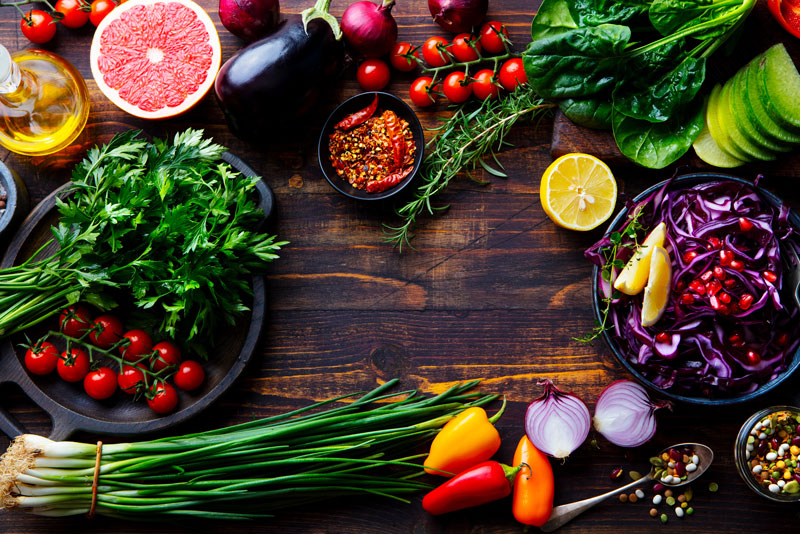June is National Fresh Fruits and Vegetables Month

The facts are undeniable: A diet with plenty of fresh fruits and vegetables supports good health
Poor food choices and chronic health conditions
We may not want to admit it, but too many of us choose foods that are not in the best interest of our health. Grocery stores keep plenty of processed foods on their shelves because people buy them.
Processed foods often have preservatives and additives that are difficult for the average consumer to pronounce, much less digest. When we’re not buying processed food at the store, many choose fast food as an alternative to healthier, less-processed foods we can prepare at home.
According to the National Institute of Health, frequently eating processed foods can negatively impact your health. It should come as no surprise that rates of obesity, heart disease, hypertension, diabetes, and other metabolic diseases in the U.S. have increased steadily over the years, along with our consumption of processed food products.
How can we change this picture?
The good news is that poor food choices and chronic diseases don’t have to be your destiny. You can start bringing your diet more in line with what's best for your health. Specifically, you can eat and enjoy more fresh fruits and vegetables with minimal cost or effort.
The USDA's Center for Nutrition Policy and Promotion recommends that 50% of the food on your plate should consist of fruits and vegetables.
These foods are low in saturated fat, salt, and sugar, so they are essential to a well-balanced diet. A “balanced diet” can help you lose weight or prevent weight gain.
The Moultrie County Health Department (MCHD) supports the National Institute of Health in the following eight reasons for eating more fresh fruits and vegetables that could help you live a healthier life.
- Fruits and vegetables are a great source of vitamins and minerals
Fruits and vegetables are packed with vitamins A, C, E, magnesium, zinc, phosphorous, and folic acid. They are also high in Potassium, an essential mineral for good health. - You can enjoy food that is flavorful and tastes terrific
Fruits and vegetables have unique flavors. This allows us to get more creative in the kitchen and improves the opportunity for everyone to find something they like to eat. Here are a few examples:- Onions, olives, and peppers offer intense flavors
- Milder flavor options could include mushrooms and corn
- Pineapples, grapes, and plums offer a sweeter flavor
- A more sour flavor option might include lemons or grapefruits
- Fruits and vegetables are an excellent source of fiber
Most fruits and vegetables have plenty of fiber. Eating these foods will help you feel full and boost your "gut health."
Vegetables considered higher in fiber include artichokes, green peas, broccoli, and cauliflower. High-fiber fruits include raspberries, pears, apples, and pumpkin. It's crucial to self-regulate portions of "starchy vegetables." These vegetables include potatoes, corn, green peas, and butternut squash. Although each is rich in nutrients, they are higher in calories and lower in fiber. - Fruits and vegetables are typically low in calories and fat
You can eat more fruits and vegetables to keep you feeling full without worrying about extra calories or fat.
However, there are exceptions. For example, avocados are an excellent source of fiber. Still, they are among the few vegetables with a relatively high-calorie count (one cup of avocado, sliced = 10 grams of dietary fiber and 234 calories). - Fruits and vegetables can help you achieve and maintain a healthy weight
These foods are low in saturated fat, salt, and sugar. That's why fruits and vegetables are considered an essential part of a well-balanced diet. Here, we're referring to a diet that can help you lose weight or prevent weight gain. - Most fruits and vegetables are naturally low in fat
If you’re looking for foods with no cholesterol—you’ve found them! It might surprise you that cholesterol doesn’t exist in fruits, vegetables, grains, and other plant-based foods. However, some plant-based foods contain healthy unsaturated fats, such as avocados and olives. - Fruits and vegetables are all nutritious
While eating fresh fruits and vegetables may be your preference, there’s little difference from a nutrition standpoint when you compare fresh, frozen, canned, or dehydrated products.Most frozen and canned products are processed within hours of harvest, so the nutritional value is locked in quickly. However, studies also indicate that nutrients in fresh and processed fruits and vegetables begin to decline after three days of storage. - Fruits and vegetables are linked to protection against cancer and other diseases
Many vegetables and fruits contain phytochemicals. These are biologically active substances that can help protect against some chronic diseases. By adding fruits and vegetables to your diet, you can lower your risk of type 2 diabetes, stroke, heart disease, high blood pressure, and cancer.
Make the better choice
Enjoying fruits and vegetables is a great way to improve your health, and you may be surprised at how much you prefer your new choices. While it may take a little creativity and effort, opening your mind to include more fruits and vegetables in your diet is worth it!

